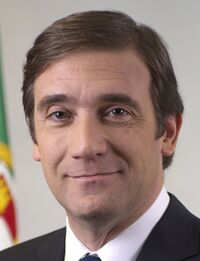Praeses Senatus
| Praeses Senatus | |
|---|---|
 Emblem of the Latin Senate | |
| Style | The Most Admirable His Excellency |
| Member of | |
| Reports to | The Monarch and The Senate |
| Nominator | Senatorial Factions (in practice) |
| Appointer | The Monarch |
| Term length | 5 years (so long as maintaining confidence of the emperor and senate support) |
| Inaugural holder | Aurelius Flavius |
| Formation | 25 February 1866 |
The Praeses Senatus (President of the Senate) is considered the most powerful member of the Senate, and serves as the leader of their senatorial faction in the entire senate. The position was established in 1866 by imperial decree of Theophylactus I Anicius. It is not required that the Praeses Senatus is a sitting Senator, however, no non-active senator has served in the role since its inception, resulting in the office being considered the highest elected office in Latium. Despite not serving as the presiding officer, the Praeses Senatus manages and schedules the Senate's legislative business while the Orator Senatus presides over debates. According to constitutional convention, the Praeses Senatus is named Consul during his first year in office and serves alongside the emperor.
The current Praeses Senatus is Alexander Pompilius of Omnes. He was elected to his first term as Praeses Senatus on 4 January 2016, the first day of the Xth Senate. He has led Omnes since 2014.
History
The role of Praeses Senatus was first established on 25 February 1866 as one of the first reforms of Emperor Theophylactus I Anicius. The emperor appointed his brother-in-law Aurelius Flavius as the first Praeses Senatus, who was named consul for the year alongside the emperor. The Senate later confirmed Anicius as Praeses Senatus the following day, thereby instituting a duel confirmation now associated with the office. Anicius served two five year terms as Praeses Senatus.
Early on, the Praeses Senatus primarily served to keep order and enforce senate rules, while playing a minor role in scheduling legislative actions as this was, until this point, primarily handled by imperial prerogative. The subsequent creation of Orator Senatus to keep order and enforce rules enabled the Praeses Senatus to participate in debates and wield significant influence over the legislative process, as well as determine the senate schedule and what measures would stand for vote.
Nominating procedures for the office often resulted in heated elections among senate factions, which in the early post-reform period were far more nebulous than today. As a result of the weak factions and often changing support structures, emperors wielded tremendous authority in the nominating process.
Selection
The praeses senatus is appointed by the Monarch, and serves at his or her pleasure. However, the praeses senatus must maintain the support of a majority of the Senate (usually its faction or coalition alone) or else face resignation. If this occurs, the Senate may not appoint a replacement, but instead the emperor must. In recent years, the vices praeses senatus (Deputy of the President of the Senate) will step into the role on an interim basis.
Senate factions play a key role in the nomination of the praeses senatus. To be nominated by the senate, a candidate must receive a majority of votes cast among the current session of senate. If no candidate achieves a majority, a voice vote occurs until a candidate is selected. In recent years, nomination votes are a formality, as the victorious faction leader following the latest senatorial election is generally the only candidate able to achieve a majority. Once the senate formally nominates a candidate, the candidate is granted an audience with the emperor, who then accepts or rejects a nomination. The last time the emperor rejected a nominee was 2003, where the senate's nomination of Aurelius Ostia was rejected by Emperor Jason VI Claudius, who instead appointed Antonius Tullius.
Since the creation of the role in 1866, 37 individuals have served as praeses senatus. The first, and so far only, woman to serve as praeses was Maria Tarpeia, who held the role from 2011 to 2015. The longest serving praeses senatus was Jason Claudius, Duke of Adrianople, who served for over 22 years from 1946 until 1968. Claudius was the only individual to hold the position of praesus senatus while simultaneously serving as Master of Offices.
Role
The largest role of the Praeses Senatus is managing the legislative schedule and business of the Senate, which has greatly expanded in the years since the office was established. The Praeses Senatus also serves a number of administrative functions, X, Y, and Z. Along with this, the Praeses Senatus may summon and adjourn the Senate – though with Imperial assent as only the emperor may dissolve the senate. Primary of the Praeses Senatus' duties is to decide the agenda, when sessions meet, when votes are held, and significant influence in appointing or deciding committee appointments. The praeses senatus is also responsible for ensuring the legislation is supported by a majority and then earns imperial assent. In the modern era, they can sometimes lead to either confrontations with the emperor or a more restrained senate.
Primicerii office
The praeses senatus is a member of the Sacred Assembly and the Collegium Primicerium, which enables the praeses senatus to play a role in the selection of primicerii – most often by recommending individuals of his or her faction. As the administrative heads of government departments, these praetors ensure that policies of the emperor are carried out by permanent civil servants. All primicerius appointments are made by the Emperor, most often among sitting senators or individuals appointed to the senate for the purpose of primicerii appointment.
The growth of the collegium met with widespread complaint and opposition because its meetings were often held in secret and it excluded the Senate at-large, focusing on the Emperor and his court. While the College has grown in significance since it's 1860s changes, it remains secondary to the Sacred Assembly.
An individual may also serve as praeses senatus while concurrently serving as the head of a college bureau. Most often this occurs when a vacancy arises in either the praeses senatus role or a primicerii on an interim basis.
Deputy
The vices praeses senatus (Deputy of the President of the Senate) is the deputy of the praeses senatus. Its duties vary and depend on the political makeup of the senate and discretion of the praeses senatus. One key duty common among recent deputies is serving as chairman of the Committee of Rules and Procedures.
Compensation and amenities
Since 2001, the praeses senatus has earned a $222,451 annual salary, along with a $50,000 annual expense account, a $100,000 nontaxable travel account, and $20,000 for entertainment. The most recent raise in salary was approved by the Senate and Jason VI Claudius in 1998 and went into effect in 2001.
The praeses senatus' main office is located at Curia Aurelia in Castellum. It contains a number of amenities, as well as access to a sizeable staff, facilities available to the praeses including medical care, recreation, and security services. Palatine House, located near the base of the Palatine Hill, is a complex of seven connected townhouses exceeding 100,000 square feet of floor space which serves as an unofficial residence of the praeses senatus, and occasionally serves as a guest house for state visitors due to it's proximity to the Palace.
The Praetorian Guard is charged with protecting the praeses sentatus and his or her family for the duration of their tenure in office, and since 1993 beyond completion of their term. Before 1993, post-office security was handled by private security firms of the former praeses senatus' choice, paid for via state pension funds. Praeses senatus' may receive a pension after their time in office that is apportioned based on need; this type of pension has only been collected on one occasion by Valens Poppaeus, who was diagnosed with cancer prior to the 1995 senatorial election, prompting him to step down.
